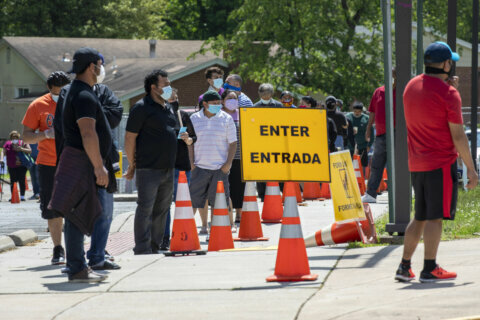Many numbers related to the coronavirus in D.C., Maryland and Virginia are shared each day, and all of the data can be confusing.
Sometimes, it looks like the number of COVID-19 cases is spiking, when in fact that may not be the case.
In Virginia’s Fairfax County, for example, work on the system used to report disease data resulted in a smaller number of reported new cases Sunday and a spike in newly-reported cases Monday.
So, what do all the numbers really mean? What do antibody tests tell? Why is there such variation in results from day to day?
WTOP asked Dr. Rene Najera, a Fairfax County Health Department epidemiologist, for the answers to some of the biggest questions about COVID-19 and other pandemic concerns.
- Q:
Why does the number of test results vary so much from day to day?
- A:
People go to different places to get tested, and the specimens are sent to different labs, not only in Virginia, but also around the country.
“Those laboratories take their time sometimes in returning those tests to us. Sometimes they do what we call ‘batching,’ where they get just a whole bunch of tests together and they wait until they hit a certain number. Some days we might get very few numbers of results because the lab is just not operating on that day. Sundays are the best example of that,” said Najera.
“We try to even that out by averaging it for the whole week … and that’s the number that we really would encourage everybody to look at — the week-to-week trends instead of the day-by-day trends.”
- Q:
Do you think Gov. Ralph Northam’s decision to require people to wear masks inside public places will make a big difference?
- A:
“His announcement is a political decision, and it’s very much up to him. I think it’s how we react to that,” Najera said.
“If we take the precautions of washing our hands, of being sure to wear a mask when we’re in public, staying away 6 feet from other people, then we are the ones who do the impact regardless of what decision is being made.
“This is transmitted by asymptomatic people, so if we all wear face masks, even if we’re infected and we don’t feel it, we keep ourselves from spreading it to somebody else.”
- Q:
What is the trend in terms of the percentage of positive tests that you’re seeing in Fairfax County?
- A:
“It’s been pretty steady at around the 20-30% area. We would like it to be a little bit lower, obviously, because we want less disease in the community,” Najera said.
“Higher percent positives usually indicate that we’re being too strict in who we’re testing. At the beginning of this, we were only testing those who were symptomatic and maybe even were hospitalized because we had a very low number of tests. But as more tests are becoming available and more labs are doing the tests, then obviously we’re casting that wider net and we’re getting the percent positive a little bit lower.
“So it’s an indicator of both less disease in the community but also that we’re doing that wide testing to try to catch as many people as possible.”
- Q:
How do we know if the coronavirus is still spreading in a given area?
- A:
That comes from talking to people who test positive. “If they haven’t been in contact with a known case that they know of, then they caught it somewhere in the community unknowingly. And that’s how we know that it’s in the community,” Najera said.
- Q:
Is more free, no-doctor’s-referral-needed testing scheduled in Fairfax County?
- A:
Not yet, but expect announcements soon. About 3,000 people were tested over the weekend in Annandale and Bailey’s Crossroads. “We’re looking to do some more of this in other parts of the county as well,” Najera said.
- Q:
When might more antibody testing be done?
- A:
It’s probably going to be a while because of the test’s limitations.
“It (antibody test) tells you if you’ve been exposed to the virus, but it does not necessarily tell you if you’re currently infected or if you’re infectious to other people. So it’s more of a diagnostic tool for knowing if you’ve been exposed at any time in the last few months, more than for a public health tool of knowing who is currently infectious,” Najera said.
“Right now, I think physicians — just like us in public health — we want to know who is currently sick so we can take care of them and also to keep them away from healthy people to prevent the spread of the infection.”
The Centers for Disease Control and Prevention says antibody test results are not accurate enough to make important policy decisions.







